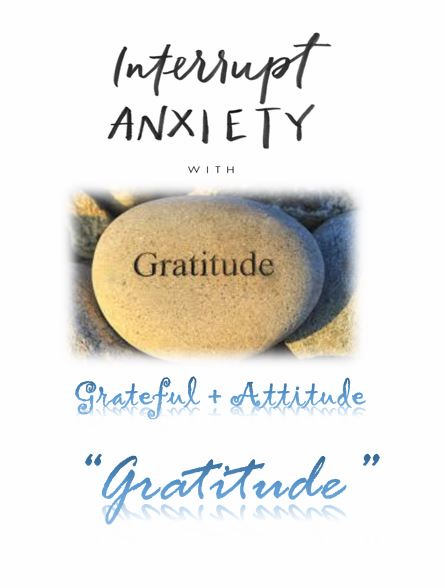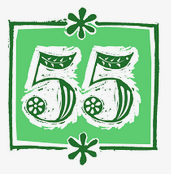A Portmanteau for Today
One definition of a Portmanteau is "a word or morpheme whose form and meaning are derived from a blending of two or more distinct forms" 1 (such as smog from smoke and fog.) Another is a large suitcase, high quality, vintage, bearing the treasured memories of travel and adventure. In the case of the word we look at today, the idea of a large suitcase carrying lots of meaningful content is quite appropriate. One of my favorite portmanteau words is "gratitude" made from combining parts of "attitude" and "grateful." It is a great way to inspire hope, keep us motivated and combat anxiety. There is a lot of anxiety in our lives right now:
- Am I going to catch the coronavirus?
- Am I going to keep my job?
- Are the children going back to school so I can go back to work?
- How am I going to feed my family?
- How do we pay our rent or mortgage?
- My car needs repaired; how do I afford that?
There seem to be no solid answers about when or if this crisis will be over. We hope for a vaccine or a great treatment to prevent death or serious harm to our health, but this is being handled by scientists and other professionals. It seems as though we just have to wait and wait and wait. This causes stress, anxiety and turmoil in our daily lives.
 To combat anxiety and stress, mental health professionals recommend cultivating gratitude for a number of reasons, which include the fact that gratitude releases toxic emotions, reduces pain, promotes better sleep, aids in stress regulation and reduces anxiety. Cultivating gratitude also fosters "adaptive coping mechanisms. By managing positive emotions like satisfaction, happiness, and pleasure, gratitude enhances our emotional resilience and builds our inner strength to combat stress." This is supported by scientific evidence, clinical studies and many testimonials. It is supported in scripture, philosophy and can be self administered.2
To combat anxiety and stress, mental health professionals recommend cultivating gratitude for a number of reasons, which include the fact that gratitude releases toxic emotions, reduces pain, promotes better sleep, aids in stress regulation and reduces anxiety. Cultivating gratitude also fosters "adaptive coping mechanisms. By managing positive emotions like satisfaction, happiness, and pleasure, gratitude enhances our emotional resilience and builds our inner strength to combat stress." This is supported by scientific evidence, clinical studies and many testimonials. It is supported in scripture, philosophy and can be self administered.2
The late Billy Graham wrote an article about thankfulness and gratitude; he had 90 years worth of life experience to reflect upon. His life was blessed but it was not stress free by any means. As a human, he suffered the same temptations, sadness, grief, uncertainty and stress as we all do. But it is how we approach and deal with anxiety that makes the difference. He says, "And yet in the midst of those trials we can thank God, because we know that He has promised to be with us and that He will help us. We know that He can use times of suffering to draw us closer to Himself: “Consider it pure joy, my brothers, whenever you face trials of many kinds, because you know that the testing of your faith develops perseverance” (James 1:2-3, NIV)."3
Interrupt your anxiety today and cultivate gratitude as a tool and a strategy for a better outlook on life! It's simple to start by listing ten things you are grateful for. Write them down and read them. See if you can add more. This is an exert from my upcoming book:
"Gratitude can change your perspective about everything. This situation occurred in 2006 and I have used the strategy numerous times to shake off the mullygrubs. One time, I changed it up a little and started to count comfort and personal hygiene items in my bathroom. 
I wrote them all down and thanked God out loud for each item, for toothpaste, a toothbrush, soap, shampoo, toilet paper, petroleum jelly and so on until the count reached fifty-five items. It does change your perspective when you stop to think that we may have fifty-five items in our bathrooms that we take for granted every day. These are things that are so lacking in other people’s lives all over the globe. It is a real eye opener and a cure for the blues!"4
My challenge to you is to find fifty-five things in your life that you count as blessings and that you are grateful for. Please comment and let me know what you discovered.

References:
1. “Portmanteau.” Merriam-Webster.com Dictionary, Merriam-Webster, https://www.merriam-webster.com/dictionary/portmanteau. Accessed 15 Aug. 2020.
2. Chowdhury, Madhuleena Roy. Positive Psychology. "The Neuroscience of Gratitude and How It Affects Anxiety and Grief." 12 May 2020. https://positivepsychology.com/neuroscience-of-gratitude/
3. Graham, Billy. BGEA. "How to be Thankful in All Things." 21 Nov 2017. https://billygraham.org/story/how-to-be-thankful-in-all-things/
4. Dougherty, Linda. Knowing and Leading Yourself First. Lakeland. 2020. Pages 83-84.